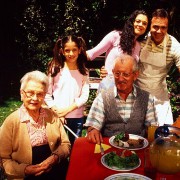 Photo: Getty Images
Photo: Getty Images
Patients with Alzheimer's disease progressively lose many of their skills, such as the ability to care for themselves. As the disease worsens, patients may have problems getting proper nutrition. In moderate Alzheimer's disease, patients may have difficulty preparing their meals. With severe Alzheimer's disease, patients cannot eat without assistance. Some of the complications of the disease can also affect nutrition. MedlinePlus, a service of the U.S. National Library of Medicine and the National Institutes of Health, notes that Alzheimer's disease patients may suffer from malnutrition and dehydration. So what can caregivers do to help with nutrition in late-stage Alzheimer's disease?
The MayoClinic.com recommends checking for any underlying conditions that may affect the patient's eating. For example, does she wear ill-fitting dentures? If so, they can make it painful for the patient to eat. Some of the medications may decrease appetite. If the patient has another condition with Alzheimer's disease, such as depression, that can also affect her eating.
Having a healthy, well-balanced diet may also help with nutritional problems in Alzheimer's disease patients. The University of Maryland Medical Center recommends fruits and vegetables high in antioxidants, such as blueberries and bell peppers, and foods high in calcium and B-vitamins, such as whole grains. Alzheimer's disease patients may also benefit from including high-fiber foods, such as root vegetables. When creating a meal for an Alzheimer's disease patient, the caregiver may substitute red meats for lean means, fish or tofu. Foods that contain trans-fats should be taken out of the diet or reduced. If using oil, caregivers can use healthy ones, such as olive oil. In addition, patients should have six to eight glass of water a day and should not use alcohol, tobacco or caffeine, according to the University of Maryland Medical Center.
Caregivers can use other techniques as well to get Alzheimer's disease patients to eat a healthy diet. For example, if the patient become easily agitated, reducing distractions during mealtime may help. The MayoClinic.com suggests using brightly colored plates and large utensils.
In some severe cases of Alzheimer's disease, patients may require a feeding tube. A feeding tube may help with nutrition and also prevents patients from breathing food into their lungs. This can be a very difficult decision for loved ones of the patient to make. The AGS Foundation for Health in Aging notes that a feeding tube may not increase a severe Alzheimer's disease patient's lifespan: 20 to 30 percent of patients die within a month and 50 to 60 percent patients die within a year of getting a feeding tube.






Add a CommentComments
There are no comments yet. Be the first one and get the conversation started!